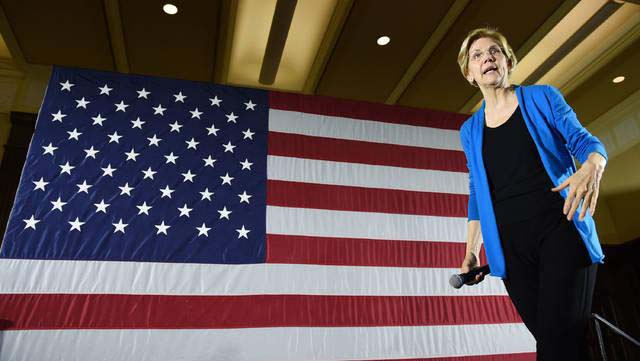Elizabeth Warren’s “lobbyist tax” attacks First Amendment in more ways than one
Nirmalendu Majumdar, Ames Tribune | TNS
Democratic presidential candidate Sen. Elizabeth Warren, D-Mass., plans to institute a tax on “excessive lobbying,” in an attempt to limit impacts on decision makers by lobbying organizations.
October 16, 2019
For better or for worse, Sen. Elizabeth Warren, D-Mass., has amassed a reputation for having a plan for everything throughout the Democratic presidential primary. A variety of criticisms have been directed at these initiatives, especially her tax proposals — largely on grounds of practicality — but constitutionality, a relatively minor issue so far, is now looming larger in light of her latest proposal to combat money in politics.
Dubbed the “excessive lobbying tax,” Warren’s idea is more than an ineffective proposal to curtail government corruption by limiting advocacy spending by organizations. Going even further, the tax would be a means to finance the creation of a new federal agency to scrutinize lobbying organizations that oppose legislation on their clients’ behalf, flying in the face of both the First Amendment and multiple Supreme Court rulings.
The party has been endlessly attacking the ruling as enabling corruption, especially the court’s argument that the right for organizations to spend money on political advocacy, apart from donating directly to candidates, is protected under the First Amendment. A sounder justification for opposing a legal ruling other than partisan hostility, and a grasp of what lobbying is, should be expected of Warren, a legal scholar, but her proposal as laid out by her campaign does nothing to dispel such worries.
“We’ll give more money to federal agencies that are facing significant lobbying activity,” Warren writes in her proposal. “Every time a company above the $500,000 threshold spends money lobbying against a rule from a federal agency, the taxes on that spending will go directly to the agency to help it fight back.”
This scheme, called a Lobbying Defense Trust Fund, involves taking money directly from those that petition lawmakers and communicate ideas and using it for the purpose of funding policies that they oppose as punishment. Instead of insulating government officials from corruption, it targets people who stand in opposition to increased federal regulation, including some aimed at specific industries — a major piece of Warren’s agenda.
Though political advocacy spending, a common type of lobbying, is certainly a form of protected speech, accusations must remain limited. It would be difficult to prove that a tax — ranging from 35% on spending above $500,000 to 75% on spending above $5 million — on such expenditures is an attempt to suppress the views of Warren’s political opponents, and such a claim should not be advanced without sufficient evidence. On its own merits, however, reasonable defense of this policy remains scarce.
The case for taxing lobbying activity is made on the basis of protecting the “public interest,” and Warren details the supposed defeat of new rules, regulations and consequently the will of the people, by corporate lobbyists — which, true or not, is a type of petition for the “redress of grievances.” The nation’s highest court has ruled against the flimsy arguments for fees applied to the press and door-to-door political advocacy, in addition to previous attempts at outright bans on campaign expenditures — something in which Warren has also expressed interest.
Limiting the influence of election spending is a popular proposition among most Americans, especially self-identified Democrats, which may explain why Warren has decided to take her own plan a step further than other candidates. Lobbyists are not a popular group in America, and pushing them out of the picture seems like an easy fix to the problem of public corruption, but misses the mark. For one, only individuals can make campaign donations — the notions that the Supreme Court has said that “corporations are people” and “money is speech” are absurd.
“The Amendment is written in terms of ‘speech,’ not speakers,” wrote Justice Antonin Scalia in his concurring opinion to the Citizens United ruling. “Its text offers no foothold for excluding any category of speaker, from single individuals to partnerships of individuals, to unincorporated associations of individuals, to incorporated associations of individuals — and the dissent offers no evidence about the original meaning of the text to support any such exclusion.”
Secondly, multiple federal watchdogs are already employed for the purpose of investigating corruption and criminal activity among public officials, but it’s not criminal for politicians to support causes that lobbyists also support. Corruption isn’t substantiated by the legal petition of elected representatives, either — and nothing of the sort can credibly be asserted unless evidence of bribery is demonstrated.
Warren is not alone in her contempt for the Court’s decision in Citizens United, or her distaste for lobbying. That notwithstanding, a presidential candidate with a previous career as a legal scholar does not have so much of an excuse for misunderstanding the fundamental democratic liberties guaranteed in the Bill of Rights. Freedom to expend resources — usually money — in order to champion political causes, and to challenge public policies, is one of them. If Warren feels that her presidential platform can only be facilitated by limitations on that freedom, then she is not, as she elucidates, “put[ting] power back in the hands of the people” — and that platform might not be one worth pursuing.



